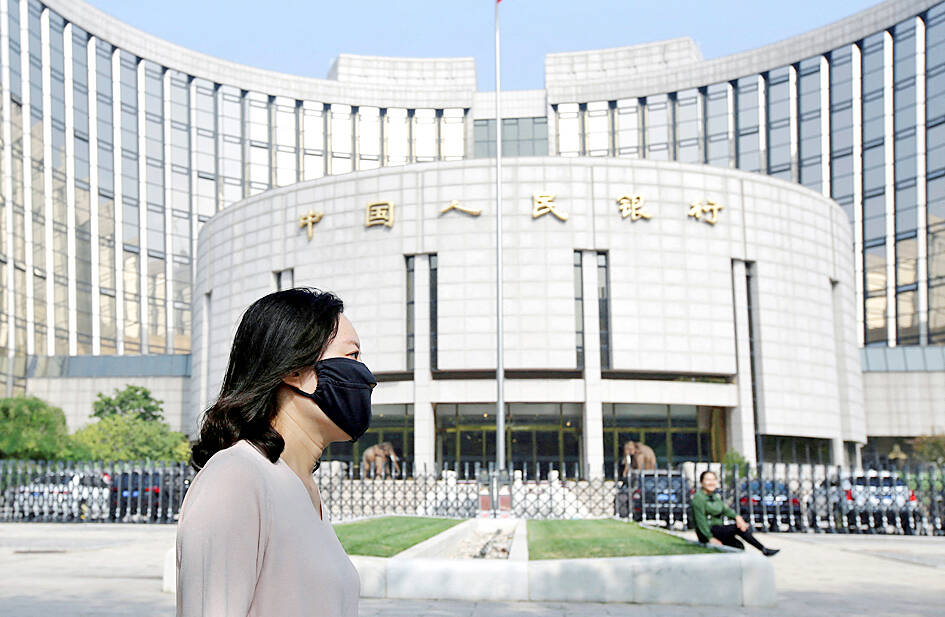China’s central bank has outlined a “moderately loose” monetary plan aimed at boosting domestic demand to spur growth, days after Chinese President Xi Jinping (習近平) called for more proactive macroeconomic policies.
Beijing last year struggled to lift the economy out of a slump fuelled by a property market crisis, weak consumption and soaring government debt.
Officials have unveiled measures aimed at bolstering growth, including cutting interest rates and easing homebuying restrictions, but economists have warned more direct stimulus might still be needed.

Photo: Reuters
The People’s Bank of China (PBOC) said in a statement on Saturday that it would “implement a moderately loose monetary policy ... to create a good monetary and financial environment for promoting sustained economic recovery.”
The statement reiterated plans to cut interest rates and the reserve requirement ratio, which dictates how much banks must hold in their coffers, rather than lending or investing.
It said the changes would be made “at an appropriate time” depending on conditions at home and abroad.
The PBOC emphasised the need to weed out corruption — signalling the continuation of a long-running crackdown in China’s finance industry.
It also said it would continue to help local governments resolve debt burdens with “financial support.” The measures are to “prevent and resolve financial risks in key areas, further deepen financial reform and high-level opening up, focus on expanding domestic demand, stabilising expectations, and stimulating vitality,” the statement said.
The bank’s announcement came after officials convened for a two-day conference in the capital.
Beijing was aiming for growth of around 5 percent for last year, a goal Xi has expressed confidence in achieving, but which many economists believe would be narrowly missed.
The IMF expects China’s economy to have grown by 4.8 percent last year and to grow by 4.5 percent this year.
Separately, the country’s foreign exchange regulator said on Saturday that it would encourage “high-quality foreign capital” to invest in China’s domestic technology sector, a statement posted on the Web site of the State Administration of Foreign Exchange said.
The government would optimize the management of overseas-traded Chinese companies’ funds and continuously improve the supervision policies governing multinational corporations’ capital, the statement added.
Additional reporting by Bloomberg

CHIP WAR: Tariffs on Taiwanese chips would prompt companies to move their factories, but not necessarily to the US, unleashing a ‘global cross-sector tariff war’ US President Donald Trump would “shoot himself in the foot” if he follows through on his recent pledge to impose higher tariffs on Taiwanese and other foreign semiconductors entering the US, analysts said. Trump’s plans to raise tariffs on chips manufactured in Taiwan to as high as 100 percent would backfire, macroeconomist Henry Wu (吳嘉隆) said. He would “shoot himself in the foot,” Wu said on Saturday, as such economic measures would lead Taiwanese chip suppliers to pass on additional costs to their US clients and consumers, and ultimately cause another wave of inflation. Trump has claimed that Taiwan took up to

A start-up in Mexico is trying to help get a handle on one coastal city’s plastic waste problem by converting it into gasoline, diesel and other fuels. With less than 10 percent of the world’s plastics being recycled, Petgas’ idea is that rather than letting discarded plastic become waste, it can become productive again as fuel. Petgas developed a machine in the port city of Boca del Rio that uses pyrolysis, a thermodynamic process that heats plastics in the absence of oxygen, breaking it down to produce gasoline, diesel, kerosene, paraffin and coke. Petgas chief technology officer Carlos Parraguirre Diaz said that in

Japan intends to closely monitor the impact on its currency of US President Donald Trump’s new tariffs and is worried about the international fallout from the trade imposts, Japanese Minister of Finance Katsunobu Kato said. “We need to carefully see how the exchange rate and other factors will be affected and what form US monetary policy will take in the future,” Kato said yesterday in an interview with Fuji Television. Japan is very concerned about how the tariffs might impact the global economy, he added. Kato spoke as nations and firms brace for potential repercussions after Trump unleashed the first salvo of

SUPPORT: The government said it would help firms deal with supply disruptions, after Trump signed orders imposing tariffs of 25 percent on imports from Canada and Mexico The government pledged to help companies with operations in Mexico, such as iPhone assembler Hon Hai Precision Industry Co (鴻海精密), also known as Foxconn Technology Group (富士康科技集團), shift production lines and investment if needed to deal with higher US tariffs. The Ministry of Economic Affairs yesterday announced measures to help local firms cope with the US tariff increases on Canada, Mexico, China and other potential areas. The ministry said that it would establish an investment and trade service center in the US to help Taiwanese firms assess the investment environment in different US states, plan supply chain relocation strategies and